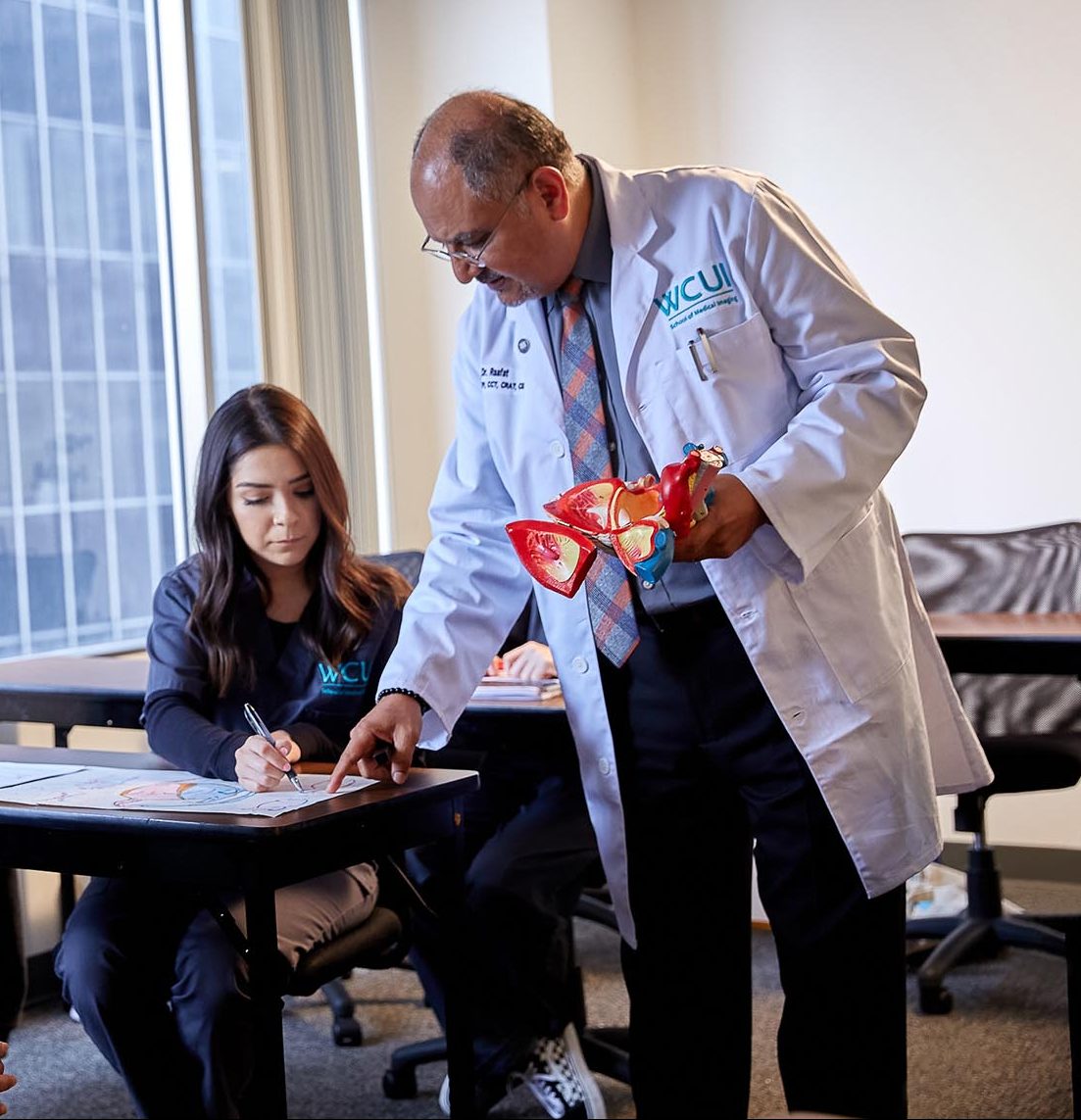INTERESTED IN LEARNING MORE?
REQUEST INFOINTERESTED IN LEARNING MORE?
REQUEST INFOThe use of cardiovascular sonography has become essential in the realm of preventative medicine, allowing medical providers to assess the health of that all-important organ: our heart. According to the American Heart Association, cardiovascular disease contributed to over 800,000 deaths in the U.S. in 2017. In Smith Chason College’s WCUI School of Medical Imaging Academic Associate of Science in Cardiovascular Sonography program, you can gain the skills and knowledge you need to pursue an in-demand career as a cardiovascular sonographer.
Diagnostic sonography utilizes ultrasound machines and imaging equipment, which use high-frequency sound waves to produce images of patient’s internal organs and tissues. It’s a key way for doctors and physicians to diagnose what’s going on inside a patient’s body without having to resort to invasive and risky exploratory surgical procedures. Cardiovascular sonography — also called echocardiography — is a specialized area of this field, focusing on using ultrasound technology to take pictures of the heart muscles, heart valves, and blood flow. This can often result in the detection of complications, diseases, and cardiac abnormalities, allowing for more accurate diagnoses that could save lives. Some cardiac sonographers even work to identify congenital anomalies during pregnancy.
As an echocardiographer or cardiac sonographer, you’re trained to perform a wide range of tasks, depending on where you work and the kinds of patients you interact with. You’ll do things like:
The path to becoming a cardiac sonographer starts with formal education through an accredited degree program, like the Cardiovascular Sonography associate degree program at WCUI. We ready you for an entry-level career in the echocardiography field, as well as helping you prepare for the necessary registries or certification exams you need in order to qualify for employment. Ideally, a cardiovascular sonography program will utilize hands-on education, informed by real medical professionals who have experience in the field.
Cardiovascular sonographers should also:
See our Pathways to Registry for Associate Cardiovascular Sonographers to see the registry exams* you’re eligible to take and which exam fees are included in the program cost.
* These registries are independent organizations and the prerequisites for eligibility can change at any time without WCUI’s knowledge or consent. This document is meant to be a guide only and all students should review the registry’s website for the most up-to-date information.
Cardiovascular sonographers need to be registered and certified by the appropriate organizations in order to step into the workplace. WCUI strongly recommends obtaining certifications to provide you with the best knowledge and opportunities when entering the sonography field. WCUI provides registry reviews and assistance with the registry exam process. See our Pathways to Registry for information on which exam fees are included in the WCUI program cost.
The associate degree program in cardiovascular sonography at WCUI features an up-to-date curriculum that combines online and in-person education, including hands-on experience in our lab settings and placement in a qualified externship. In our Diagnostic Cardiovascular Sonography program, you’ll cover topics like:
Our mission and values at WCUI are about promoting the academic excellence and integrity of our graduates in a way that is supportive and contributes positively to our students’ lives. We are here for you, to get you the healthcare education you need for success.
Our echocardiography associate degree program features both lecture-based courses and lab work in:

There are a few key factors affecting the healthcare field right now: our aging baby boomer and millennial populations, and the increased prevalence of diabetes, obesity, and other chronic health conditions. All of these elements help explain why the Bureau of Labor Statistics expects jobs for sonographers to grow much faster than average — 19% through 2030.
*State of California EDD https://www.labormarketinfo.edd.ca.gov/data/employment-projections.html “Projected growth” represents the estimated change in total employment over the projections period (2018-2028).
**Arizona Commerce Authority https://www.azcommerce.com/oeo/labor-market/employment-projections/ “Projected growth” represents the estimated change in total employment over the projections period (2020-2030)
The growing need for cardiac sonographers means that the opportunities for employment range widely across the country, with a lot of echocardiographers being employed at:
But just under half are employed outside of those settings, in medical facilities and organizations that include:
WCUI’s Academic Associate of Science in Cardiovascular Sonography program can be completed in as few as 21 months, and students become eligible for relevant CCI registry exams upon graduation.
In response to COVID-19, WCUI has moved to a hybrid educational model so your education doesn’t miss a beat. Our program combines online lecture classes with in-person ultrasound labs and 6-months of externship at a hospital or clinical site.
WCUI was founded by well-respected medical professionals, and we’ve been using our experience and knowledge to help our students begin successful careers for over 20 years. We’ve been accredited by the Accrediting Commission of Career Schools and College as a private post-secondary vocational school since 2001.
Are you ready to advance your education? Find the information you need to apply to the WCUI School of Medical Imaging on our Admissions Page or contact our admissions team today.
ENROLLING NOW! Now enrolling for Spring Term starting April 1